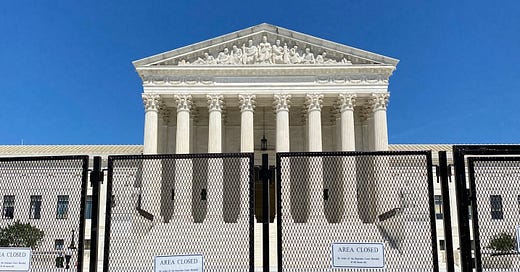Supreme Court overrules Maine's ban on funding to religious schools
Critics see the decision as demolishing the Establishment Clause, but all the decision does is treat religion fairly
The United States Supreme Court is nearing the end of its most recent term. A number of high-profile decisions are yet to be announced, including a potentially seismic ruling on Second Amendment rights and, of course, the likely end of constitutionally-protected abortion rights.
But yesterday, the Court released its decision in Carson v. Makin, one of two cases from this term with significant implications for religion in the United States (the other, involving the “praying football coach,” should be announced soon). In Carson, the Court rejected Maine’s prohibition on state funding to religious schools, with Chief Justice Roberts writing that the system amounts to “penaliz[ing] the free exercise of religion.”
The details of the case are simple. As a rural state, many of Maine’s school districts do not operate secondary schools. To deal with this, the state created a tuition assistance program for families living in these districts, requiring the district to pay for a child’s tuition at a state-approved public or private school. Importantly, in 1981, Maine passed an update to the program prohibiting funding from going to sectarian (religious) schools. But yesterday, over 40 years later, the Supreme Court struck down that provision, requiring funding to go to any approved school, sectarian or nonsectarian.
Roberts’ majority opinion drew on several related cases, but two warrant brief discussion:
Zelman v. Simmons-Harris (2002), in which the Court upheld an Ohio program providing school vouchers to parents who wished to send their children to schools outside their own failing districts. The vast majority of parents elected to use these vouchers at private, religious schools, something that critics alleged violated the First Amendment’s Establishment Clause. However, Chief Justice Rehnquist wrote for a 5-4 Court that the program left the decision on where to spend the vouchers entirely with the parents; it therefore could not be construed as establishing a religion. The program, he wrote, “permits such individuals to exercise genuine choice among options public and private, secular and religious. The program is therefore a program of true private choice.”
Trinity Lutheran v. Comer (2017), in which the Court struck down a Missouri policy that restricted funding for playground renovations solely to nonsectarian organizations. The program welcomed groups to apply for grants to improve the safety of their playgrounds, including those at private schools. Trinity Lutheran Church operates a preschool and daycare facility, and applied through the program. It met the criteria of the program in every respect but one—it was a religious group—and its application was denied. Trinity Lutheran sued, and in a 7-2 decision the Court ruled for the school, with Chief Justice Roberts writing that “The Department’s policy expressly discriminates against otherwise eligible recipients by disqualifying them from a public benefit solely because of their religious character.” The decision concluded by calling such a policy “odious to our Constitution.”
These precedents and principles were essential to the Court’s decision in Carson. Drawing on Zelman, Roberts wrote, “A neutral benefit program in which public funds flow to religious organizations through the independent choices of private benefit recipients does not offend the Establishment Clause.” And drawing on Trinity Lutheran, Roberts said the schools in Maine were denied access to generally available funding solely because of their religious natures. Correcting this error, he surmised, was an “unremarkable” action for the Court to take.
Critics quickly panned the decision as demolishing the Establishment Clause and its supposed “wall of separation between church and state.” In her dissenting opinion Justice Sotomayor invoked this language, writing, “Today, the Court leads us to a place where separation of church and state becomes a constitutional violation.” Further, Vox’s Ian Millhiser criticized the Court for supposedly “view[ing] neutrality toward religion as a form of discrimination.” Slate’s Mark Joseph Stern expressed concern that the decision will require states to fund education promoting discrimination. And Rolling Stone’s David Cohen lamented that the decision is evidence that the Court’s conservatives “are doing what they can to transform the country into a Christian theocracy.”
Histrionics aside, I want to focus on Millhiser’s objection, because it’s a common one that misses the mark in a big way. According to Millhiser, Maine’s program funding secular private education and not religious private education amounts to neutrality toward religion, in that no one religion is being privileged. This is not neutrality, though, since nonsectarian private education is being privileged at the expense of sectarian private education.
It’s one thing for the state to fund and manage public schools; having the government involved in running religious schools would certainly violate the Establishment Clause. But when the government opens funding programs to private schools, it cannot close off a segment of schools from eligibility solely because of the religious nature of these schools. Neutrality and fairness actually requires the opposite result, the one endorsed by a majority of the Court in this case.
Carson is not a dramatic departure from recent precedent; it’s entirely consistent with how a majority of the Court has read these issues for decades. And, despite the hyperbole from its critics, the decision does not spell the end of public education in the United States or represent the fusion of church and state. Instead, it merely requires governments to treat religion fairly.



